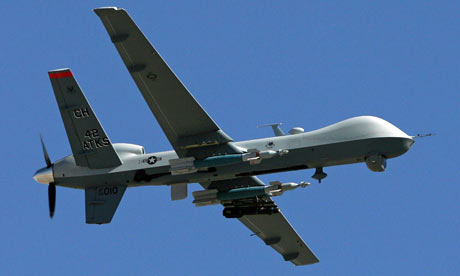 |
| Photo Credit: The Guardian |
In other words, some technologies increase the costs of war (nuclear weapons) and others decrease them (drones). Unsurprisingly, corresponding incentive effects abound. The unthinkable horror of nuclear war has undoubtedly contributed to the relative peace among nuclear powers. On the flip side, emerging drone technology has made tiny, "surgical" military actions incredibly easy, resulting in tons of tiny, "surgical" military actions.
To some, drones are heralded as a humanitarian victory for the world: the vital risk to soldiers and pilots is reduced. Seen in a different light, the increased "variablizeability" (i.e. costless scaling) of war is ominous to the extreme. By crashing the domestic political costs of military action down to nearly zero, drones can potentially beat out other less-violent alternatives in foreign policy dilemmas, such as statecraft or economic sanctions. One even wonders if a simple "drone fix" might become the go-to policy choice of unencumbered politicians.
The key point here is that war is not simply a question of easily-quantified costs and benefits. The act of one sovereign state exerting coercive force over another has strong moral, psychological, historical, and cultural dimensions and associations. These other facets of war don't necessarily track with simple physical destruction: one bomb fired by a robot killing one person might nonetheless be interpreted as a grave moral and ethical affront to an entire society. It might just be a really good time to double-check our constitutional and bureaucratic procedures for authorizing the use of violence in foreign territory.
No comments:
Post a Comment